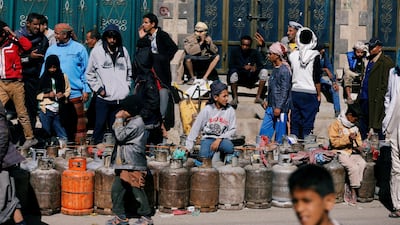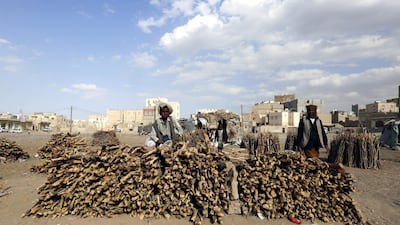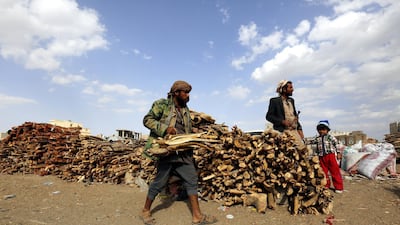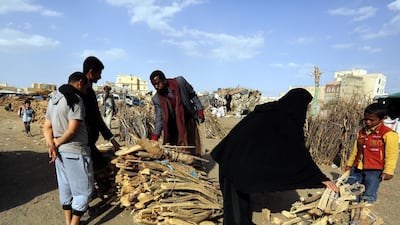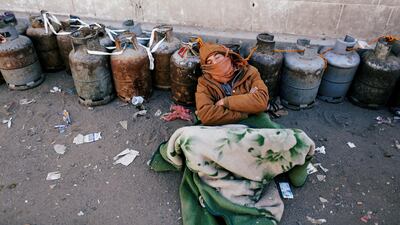Yemenis across rebel-held Sanaa protested on Sunday against a severe gas shortage caused by additional taxes implemented by the Houthis on fuel tankers.
Dozens of people took to the streets, blocking roads, burning tyres and demanding there be an end to the shortage crisis – now in its second week.
Abed, who would only give his first name for security reasons, said that residents in Sanaa – which has been under Houthi control since 2015 – have “reached a boiling point”.
"We are living in critical times, especially the last two weeks. We struggle for days to get a cylinder of gas even if we are paying crazy prices," he told The National. "What was 1,200 Yemeni rials (Dh17.6) three years ago, we now buy for 10,000 rials from the market."
Citizens in the capital form long queues at gas stations to buy supplies at cheaper prices, but even there, prices have been hiked by 100 per cent, residents said.
“The Houthis in charge appear to be complicit with the gas merchants, who manipulate the prices,” Abed said.
He added that gas merchants are attributing the sharp rise in prices to the tax implemented by the Iran-backed Houthis in provinces they control.
Abed said that many gas station owners were closing their businesses and have stopped importing gas all together.
Meanwhile, activists in Sanaa launched a social media campaign calling for residents in the capital to take part in the protests against the Houthi rebels, against whom forces loyal to the internationally recognised government of President Abdrabu Mansur Hadi have been battling since 2014.
One activist and journalist, Ahmed Al Safani, said on Twitter that people must rise against the Houthis, who “are torturing the people in Sanaa by denying them access to basic humanitarian needs”.
Moammar Al Eryani, Yemen’s minister of information, accused the Houthi militias of using gas and oil revenues to fund their military activities.
“They took advantage of gas and fuel shortages in Sanaa three years to lead a coup against the legitimate government of Yemen and now they sell people gas and fuel in the black market with a mark-up price of 500 per cent,” he said on Twitter on Sunday.
The Yemeni government – which is backed by an Arab coalition in the country – called on the international community on Sunday to stand united against the Iranian government, which has been accused of transporting arms to the Houthi rebels, reported UAE's state news agency, Wam.
"The Houthi militias, which are backed by Iran, work at every level to prevent a sustainable peace in the country," Abdulmalik Al Mekhlafi, Yemen's minister of foreign affairs, said during a meeting with US ambassador to Yemen Matthew Tueller.
The reports said that Mr Tueller reiterated his country's support for the legitimate Yemeni government.
The Saudi-led coalition – which includes the UAE – intervened in the Yemen war in 2015.
More than 10,000 people have been killed and more than two million displaced since the war broke out. Yemen relies heavily on food imports and is on the brink of famine. The United Nations says more than 22 million of the country's 25 million population need humanitarian assistance, including 11.3 million who are in acute need.
